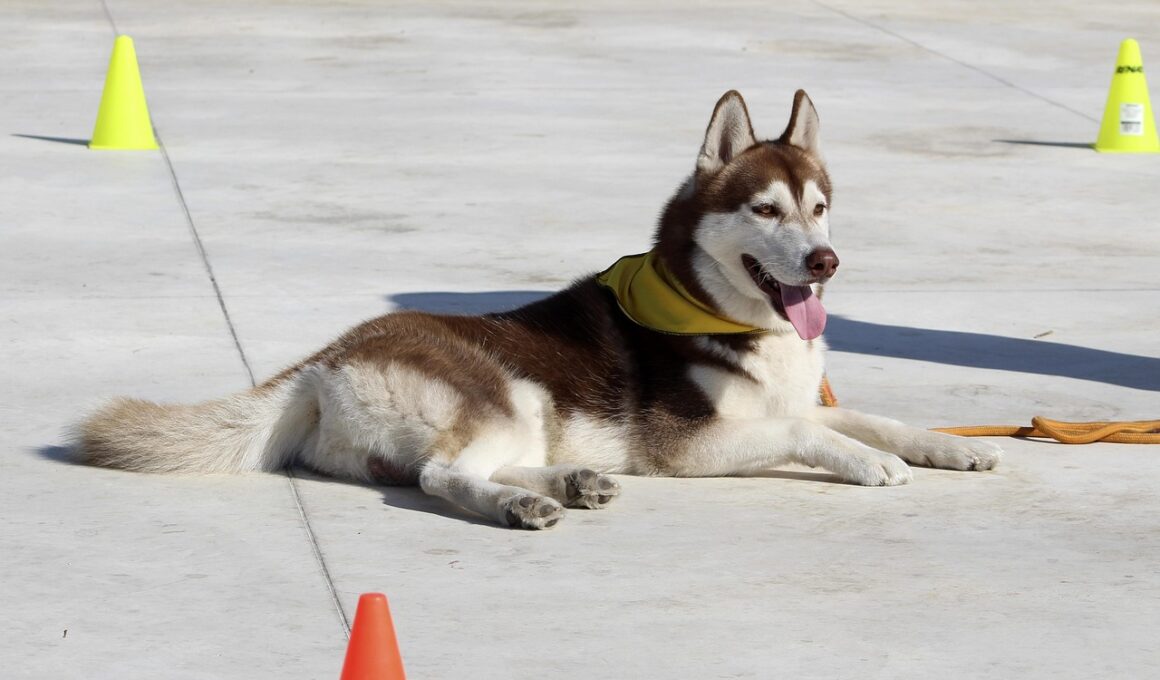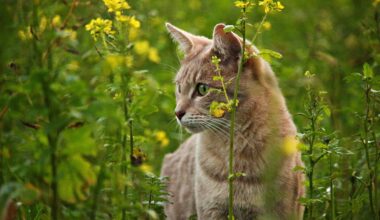Training Puppies for Future Dog Show Success
When it comes to training puppies for dog shows, an early start is crucial. Young dogs are remarkably adaptable, making them more receptive to training. Enrolling your puppy in a dog show training workshop can enhance their social skills. In these workshops, trainers often emphasize basic obedience as the foundation. Key commands like “sit,” “stay,” and “come” are not just commands; they’re essential for success in the ring. Positive reinforcement techniques are widely adopted, encouraging puppies to associate good behavior with rewards. Consistency is critical as well, requiring regular practice at home. Create a practice schedule that allows for short, frequent sessions. Additionally, mental stimulation is vital; providing toys that challenge your puppy can aid in their overall development. Consider inviting friends or family members over to expose your puppy to different people. Socialization with other dogs is also necessary for developing good manners. Incorporate frequent outings to various environments, such as parks or public places. This experiences help puppies become accustomed to the sights, sounds, and smelly distractions they will face during dog shows.
Essential Skills for Dog Shows
Training a dog for shows requires not just basic obedience but also additional skills. Your puppy must learn to walk gracefully on a leash while maintaining focus. This skill set is essential for impressing judges and captivating audiences. Training workshops often focus on building these specialized skills through repetition of simple tasks like walking and standing still. Puppies can be taught to pose in specific ways by offering treats for correct positions. This encourages natural posing while helping them feel comfortable handling. Grooming is another critical aspect, as show dogs need to appear polished and clean. Regular brushing and bathing become essential practices in their training routine. Exposure to different grooming tools, such as clippers and brushes, can help your puppy become accustomed to the grooming process. Ensuring your puppy enjoys the grooming will foster a positive association with it. Incorporating playfulness into training sessions can make learning more enjoyable. Remember, patience is key; every dog learns at their own pace, and adjustments may be necessary to tailor their training experience effectively.
Building Confidence in Show Puppies
To succeed in the dog show world, a puppy must exhibit confidence. Confidence can be built through gradual exposure to various situations including crowded venues and new environments. Regular attendance at training workshops can familiarize them with actual show settings. Whether it’s walking on different surfaces or listening to various noises, helping your puppy tackle these challenges is essential. Another effective technique involves socialization practices, introducing your puppy to new dogs and people. This interaction helps them develop a balanced demeanor in the show ring. Use positive reinforcement to reward brave behaviors during these interactions. If your puppy shows signs of anxiety, be supportive but remain calm yourself. Setting realistic expectations is also imperative; every puppy is unique, and some may take longer to adapt. Including activities like agility courses or fun runs diversifies their training. They learn to navigate obstacles confidently, which enhances their overall dynamism. Remember, it’s all about making training an enjoyable experience, allowing your dog to view competitions positively. Your puppy should associate the dog show environment with fun, not fear, to truly shine when the time comes.
In addition to training, proper diet and exercise play vital roles in your puppy’s success. Nutrition impacts their energy levels, coat condition, and even temperament. Consult your veterinarian for recommendations tailored to your puppy’s specific needs. Ensure that your puppy maintains a healthy weight as excess weight can hinder agility and stamina during competitions. An active lifestyle is equally important; daily walks and playtime help keep your puppy physically fit. Engage in exercises that promote core strength and endurance, essential qualities for show success. Swimming or playing fetch can be beneficial, providing variety in their routine. Choose safe environments for exercise, avoiding busy streets or areas with potentially dangerous elements. Moreover, consider your puppy’s preferences; some may enjoy fetching balls more than running with other dogs. Incorporate these enjoyable activities regularly to maintain enthusiasm and motivation. Keeping track of their progress through video recordings can provide insights into areas that require improvement. Engaging with trainers or experienced handlers can lend invaluable perspectives as you shape your puppy into a compelling show dog.
Making Training Fun
Puppy training should always be an engaging and enjoyable experience. Incorporating games into training can significantly enhance the learning process. Interactive activities encourage a bond between you and your puppy. Use toys like tug ropes or balls during practice sessions to make them more dynamic. Keep training sessions short and focused; young puppies have limited attention spans. To maintain enthusiasm, change training locations occasionally. New environments can spark interest and excitement in your puppy. Setting up mini-obstacle courses at home can also serve as an enjoyable challenge. These courses can test various skills such as jumping, weaving, and crawling. Celebrate small achievements with praise and treats, building your puppy’s confidence. Role-playing competition scenarios can also familiarize your puppy with show atmospheres. Invite friends to interact as judges while you practice at home. This exercise prepares your puppy for the pressure of actual events. Remember, not every session needs to be intense; incorporating relaxation time is crucial too! Stretching and play should be included, allowing your puppy to recharge. Maintaining a balanced routine is essential for a happy training journey.
As your puppy starts progressing in their training, it’s crucial to evaluate their emotional well-being continuously. Watch for signs of stress or fatigue, as these could indicate your puppy may need a break. Ensure that training does not become overwhelming. Avoid over-scheduling their activities to prevent burnout. It’s equally important to listen to their body language. If your puppy seems disinterested or resistant, try modifying your approach to keep them engaged. Maintaining an open line of communication with your trainer can offer fresh insights into adapting the training plan to suit your puppy’s current mindset. Additionally, consider celebrating milestones together. Whether it’s a successful competition or mastering a new skill, acknowledging achievements fosters a deeper connection. Incorporating family members into training sessions can also enhance your puppy’s social network, making the process more enjoyable. With a strong support system, your puppy will feel cherished and appreciated. Remember that building a future show dog involves more than just training; it’s about nurturing a well-rounded and happy pet. With continued patience and love, your puppy will thrive both in and out of the show ring.
Preparing for the Show Day
Preparing for the show day involves several essential steps that can’t be overlooked. Ensure that your puppy is familiar with the show venues to reduce anxiety. Attending local shows creates a comfortable environment for your puppy leading up to the competition day. This exposure allows them to adjust to unfamiliar surroundings and other dogs. On the actual show day, have a structured timeline to avoid rushing. Arrive early, allowing your puppy time to acclimate before their turn in the ring. Communicate with fellow competitors and organizers to gather useful insights about the competition. During the pre-show ritual, stay calm and relaxed to instill a sense of peace in your puppy. Engaging in a light grooming routine can help settle both you and your puppy. Remember to bring along snacks and water to keep your puppy hydrated and fueled. Keeping a positive and cheerful demeanor will help your puppy remain confident and comfortable. Avoid distractions from the crowd and focus only on your dog. Celebrate the experience irrespective of the outcome, remembering that each event is an opportunity for growth and development.
Regardless of the outcome, every experience in training and shows contributes to your puppy’s development. Reflecting on the journey involves recognizing the challenges and triumphs you have faced together. Documenting progress through videos or notes can provide insights useful for future competitions. It’s important to maintain a learning mindset; every show serves as an educational experience. Whether your puppy wins or doesn’t, the bond you strengthen through training is invaluable. Often, the path taken is as enjoyable as the destination itself. Maintaining focus on enjoyment over winning can help mitigate the pressures associated with shows. Encouraging an adventurous spirit will ensure your puppy remains eager to learn and grow. Connecting with fellow dog show enthusiasts fosters a supportive community. Share experiences, tips, and techniques to enhance each other’s journey. Building a network can offer motivation and support during challenging phases. Ultimately, each training session brings your puppy one step closer to becoming a well-rounded show dog. With love, persistence, and commitment, the memories created along the way will last a lifetime. Cherishing every moment shared during this journey makes it rewarding for both you and your puppy.


